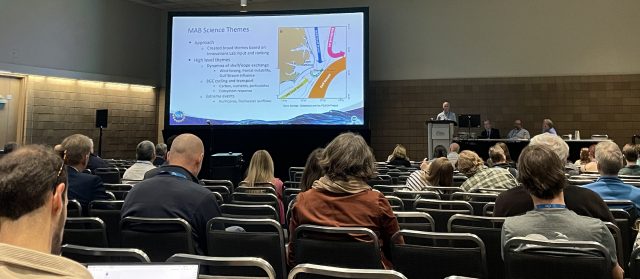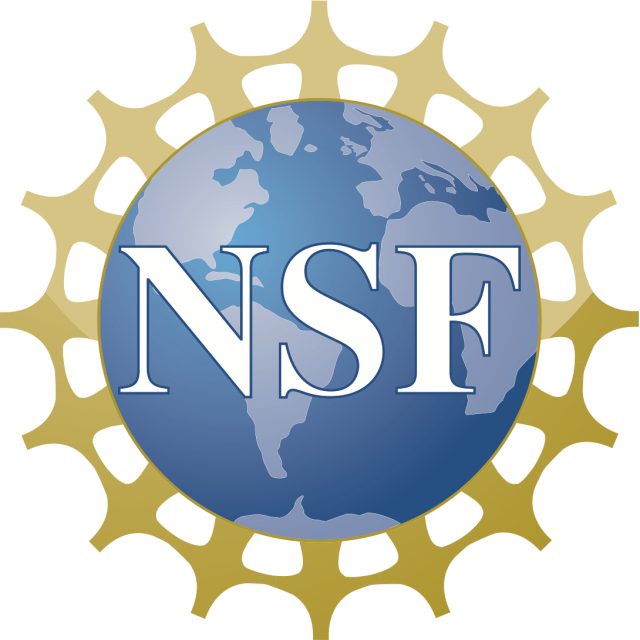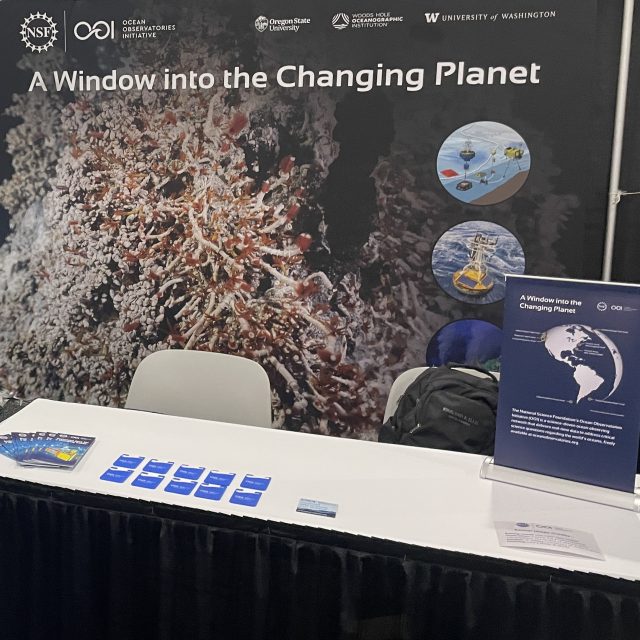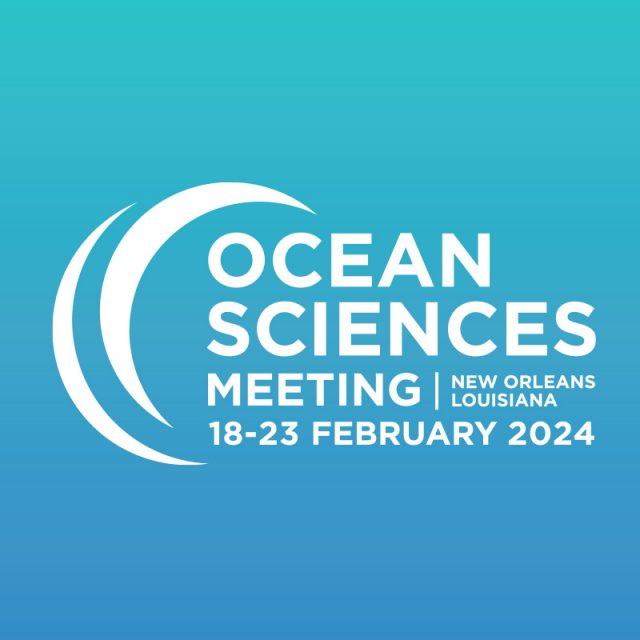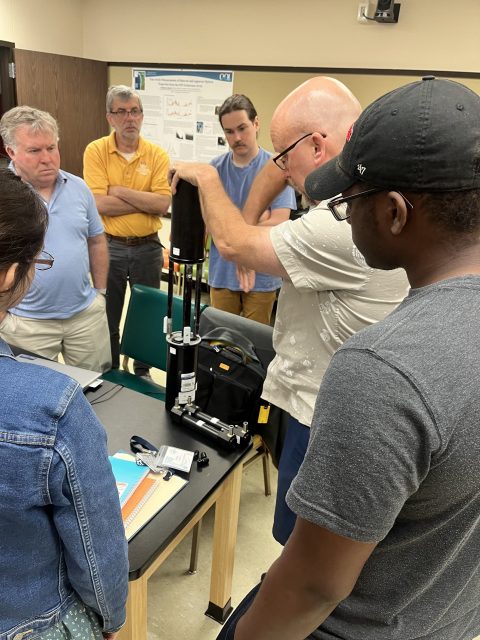Posts Tagged ‘OOIFB’
Call for Applications for OOIFB
[Application Deadline: April 24, 2024]
The U.S. National Science Foundation (NSF) Ocean Observatories Initiative Facility Board (OOIFB) is tasked with representing the science community and users of the NSF Ocean Observatories Initiative (OOI) Facility. The OOIFB works to expand scientific and public awareness of OOI, and ensure that the oceanographic community is kept informed of developments of NSF OOI.
The OOIFB is soliciting applications to fill two membership positions that will open as of June 1, 2024, and run through June 1, 2027. Each selected individual will then be eligible to serve an additional 3-year term. The OOIFB holds at least one in-person meeting per year and one web conference each month.
Scientists, spanning water column to seafloor expertise, as well as experimentalists, engineers, and modelers, with experience using scientific observing systems, such as the OOI, are encouraged to apply. All interested applicants will be considered.
The responsibilities of the OOIFB may include, but are not limited to, the following:
- Serving as the prime scientific and technical conduit between the oceanographic community and NSF regarding OOI.
- Examining the accomplishments and work flow of the NSF OOI Operator, in order to provide feedback regarding the NSF OOI Annual Work Plans (AWPs).
- Via workshops, community meetings, and/or other mechanisms, stimulate and engage the user community in order to keep the accomplishments of the NSF OOI at the cutting edge of scientific inquiry and technological innovation.
- Developing and implementing strategies to expand scientific and public awareness of the unique scientific and technological opportunities of the NSF OOI.
- Helping to identify collaborative relationships with potential governmental, industrial, educational, and international partners in the NSF OOI, where appropriate.
- Ensure fair and consistent access to the NSF OOI by all sectors of the user community.
Applications should be submitted to Holly Morin, at the OOIFB Administrative Support Office (holly@ooifb.org), and must include a letter of interest and a CV. The statement of interest should highlight the applicant’s experience using observatory data and have fostered an environment of respect in their research endeavors.
Please note, applications cannot be accepted from individuals affiliated with the NSF OOI Program Facility institutions (Woods Hole Oceanographic Institution, Oregon State University, and the University of Washington), individuals under contract with the NSF OOI Program, and individuals from institutions already represented on the OOIFB (the current list of OOIFB members is available HERE).
Applications are due by April 24, 2024. Applications will be reviewed by the OOIFB, who will give due consideration to the qualifications of applicants, as well as the maintenance of gender, career level, discipline, and regional balance on the OOIFB. For more information about OOIFB and its activities, please visit the website, or contact Dax Soule, OOIFB Chair (Dax.Soule@qc.cuny.edu).
Read MoreNSF Announces Solicitation for OOIFB Support Office
Pioneer MAB Array Workshop Applications
Old Dominion University, Norfolk, VA
The Ocean Observatories Initiative Facility Board (OOIFB) will host a community workshop focusing on current and future initiatives that can be addressed using data from the National Science Foundation’s (NSF) OOI Coastal Pioneer Array, which is planned to be relocated to the Southern Mid-Atlantic Bight. The workshop will be held at the Webb University Center, Old Dominion University, in Norfolk, VA, on September 10-12, 2024.
The event will bring together a diversity of scientists, resource managers, educators, and other stakeholders to learn about the capabilities of the Coastal Pioneer MAB Array and the cutting-edge research that can be done in this new location. The workshop also will provide a forum to facilitate cross-network collaborations, identify strategies for better engaging current and future users of the NSF’s OOI, and foster the research and proposal development process. NSF OOI Program team members and NSF representatives will be on hand to answer questions and provide information on NSF OOI operations.
Researchers who are using or are considering using NSF OOI data; resource managers from national, state, and tribal agencies; and educators at all levels interested in using data from the NSF OOI Coastal Pioneer MAB Array are encouraged to participate in this community workshop. To apply for the workshop, please complete the online application form that is available on the workshop web page. Travel support is available, but limited. Broad representation from institutional, geographic, and disciplinary groups is desired and will be considered in participant selection. The deadline for applications is March 26, 2024.
Additional details about the workshop and agenda are available here. If you have any questions, please be in touch.
Jupyter Hub Town Hall: March 6, 1 pm ET
Curious about Jupyter Hub, which gives users access to computational environments and resources in their own workspaces on shared resources?
OOI is hosting a virtual town hall on Wednesday March 6, 2024 at 1 pm Eastern, where you can learn how researchers and educators are using OOI’s Jupyter Hub in their research and classrooms. During this one-hour town hall, OOI Data Lead Jeffrey Glatstein, OOIFB Chair and Queens College Assistant Professor Dax Soule, and OOI Data Expert Stace Beaulieu will give hands-on demonstrations of OOI Jupyter Hub. The emphasis will be on practical applications of this important resource, with plenty of time to ask questions.
Mark your calendar! Register to add this important resource to your repertoire.
- Date: Wednesday March 6, 20224
- Time: 1-2 pm Eastern
- Location: Zoom Webinar
- Register here.
Read More
Coastal Pioneer MAB Community Workshop
OOI at Ocean Sciences Meeting 24
OOI will be at booth #210 at the Ocean Sciences Meeting in New Orleans from 18-23 February 2024. Please visit our booth. Daily we have an OOI data expert giving in-person demonstrations on how to use Data Explorer in your research. Times and topics will be announced soon, so stay tuned.
The following is a compilation of OOI-related presentations at this year’s Ocean Sciences Meetinh. If we’ve missed any OOI-related sessions, please contact dtrewcrist@whoi.edu and we will be happy to add them. Hope to see you in person this year! Share your OSM news at #OSM24.
Monday, 19 February 2024
09:40 – 09:50 Eastern (08:40 – 08:50 CST) 203-205, Second Floor (Convention Center)
10:03 – 10:14 Eastern (09:03 – 09:14 CST) 215-216, Second Floor (Convention Center)
10:47 – 10:58 Eastern (09:47 – 09:58 CST) 208-209, Second Floor (Convention Center)
11:45 – 11:55 Eastern (10:45 – 10:55 CST) R06-R07, Second Floor (Convention Center)
Katherine Shrader, James Madison University, Geology and Environmental Science, Harrisonburg, VA, United States, Nicole S Lovenduski, University of Colorado, Department of Atmospheric and Oceanic Sciences, Boulder, CO, United States and Genevieve Clow, University of Colorado at Boulder, Atmospheric and Oceanic Sciences, Boulder, United States
15:30-16:00 CST Exhibit Hall, Booth #210
Data Demo on Global Irminger Sea Array
15:49 – 15:58 Eastern (14:49 – 14:58 CST) 229-230, Second Floor (Convention Center)
Andrew Scherer, Oregon State University, College of Earth, Ocean, and Atmospheric Sciences, Corvallis, United States, Melanie R Fewings, Oregon State University, College of Earth, Ocean, and Atmospheric Sciences, Corvallis, OR, United States and Thomas Connolly, Moss Landing Marine Laboratories, Moss Landing, CA, United States
16:06 – 16:17 Eastern (15:06 – 15:17 CST) 225-227, Second Floor (Convention Center)
17:00 – 19:00 Eastern (16:00 – 18:00 CST) Poster Hall, First Floor (Convention Center)
15:00-18:00 CST Exhibit Hall – Visit OOI’s Booth #210
18:00 CST OOI Meet up at The Rusty Nail, 1100 Constance Street, New Orleans
Tuesday, 20 February 2024
09:30 – 11:00 Eastern (08:30 – 10:00 CST) eLightning Theater, First Floor (Convention Center)
1o:00-10:30 CST Exhibit Hall, Booth #210
Data Demo on Coastal Endurance Array
13:45 – 14:45 Eastern (12:45 – 13:45 CST) 220-222, Second Floor (Convention Center)
15:30-16:00 CST Exhibit Hall, Booth #210
Data Demo on Coastal Pioneer New England Shelf Array
15:44 – 15:55 Eastern (14:44 – 14:55 CST) 211-213, Second Floor (Convention Center)
17:00 – 19:00 Eastern (16:00 – 18:00 CST) Poster Hall, First Floor (Convention Center)
OT24B-1524 Assessment and Improvement of Dissolved Oxygen Measurements from NSF Ocean Observatories Initiative Gliders
Stuart Pearce1, Peter J Brickley2, Jonathan Whitefield3, Diana Wickman2, Collin Dobson2, Russell Desiderio3, Albert J Plueddemann2 and Edward Paul Dever4, (1)Oregon State University, College of Earth, Ocean, and Atmospheric Sciences, Corvallis, OR, United States, (2)Woods Hole Oceanographic Institution, Woods Hole, United States, (3)Oregon State University, College of Earth, Ocean, and Atmospheric Sciences, Corvallis, United States, (4)Oregon State University, Corvallis, OR, United States
OT24B-1523Application of Automated Quality Control Flags to OOI Data: Identification of Storm Events at Coastal Pioneer Array
Kylene Cooley, Woods Hole Oceanographic Institution, Ocean Observatories Initiative, Woods Hole, United States and Andrew C Reed, Woods Hole Oceanographic Institution, Woods Hole, MA, United States
OT24D-1537 Comparison of Vertical Temperature and Salinity Structures in the Northeast Pacific Ocean from Nested Regional Ocean Models
Caitlin Amos, US Naval Research Laboratory, Stennis Space Center, United States, John J Osborne, U.S. Naval Research Laboratory, Ocean Sciences Division, Stennis Space Center, MS, United States and Gregg A. Jacobs, Naval Research Lab, Stennis Space Center, MS, United States
10:00-18:00 CST Exhibit Hall – Visit OOI’s Booth #210
Wednesday, 21 February 2024
09:50-10:00 Eastern (08:50 – 09:00 CST) 210, Second Floor (Convention Center)
DO31A-03 Building Training Datasets through the Documentation of Species Diversity and Abundance at ASHES vent field, Axial Seamount, for Future Machine Learning Applications
Julia Sandke1, Danilo Seskar2, Hikari Oshiro2, Karen G Bemis3 and Dax Christian Soule4, (1)CUNY Queens College, School of Earth and Environmental Sciences, Flushing, United States, (2)Rutgers University New Brunswick, Marine and Coastal Sciences, New Brunswick, United States, (3)Rutgers, The State University of New Jersey – New Brunswick, Marine and Coastal Sciences, New Brunswick, United States, (4)CUNY Queens College, School of Earth and Environmental Sciences, Flushing, NY, United States
1o:00-10:30 CST Exhibit Hall, Booth #210
JupyterHub demo for AUV data from Coastal Pioneer New England Shelf Array
15:30-16:00 CST Exhibit Hall, Booth #210
Data Demo on Global Southern Ocean Array
17:00-19:00 Eastern (16:00 – 18:00 CST) Poster Hall, First Floor (Convention Center)
OT34B-1585 A Glider Study of Seasonal Changes in Bio-Optical Properties and Phytoplankton Biomass at the New England Shelf Break Front
Robert D Vaillancourt, Millersville University of Pennsylvania, Millersville, PA, United States and Michael A. Miller, Millersville University of Pennsylvania, Earth Sciences, Millersville, United States
ED34B-0145 Correlation of Diffuse Venting with Geophysical Time Series at Axial Seamount
Cal Mills1, Melissa Celik1, Fabio Dos Santos1, Karen G Bemis2 and Dax Christian Soule3, (1)CUNY Queens College, Flushing, United States, (2)Rutgers, The State University of New Jersey – New Brunswick, Marine and Coastal Sciences, New Brunswick, United States, (3)CUNY Queens College, School of Earth and Environmental Sciences, Flushing, NY, United States
PS34B-2105 What makes the seasonal stratification breakdown at the US Northeast shelfbreak front so rapid? – Comparing contributions from surface forcing, local mixing, and lateral advection
Lukas Lobert1,2, Ke Chen2, Albert J Plueddemann2 and Glen Gawarkiewicz2, (1)Massachusetts Institute of Technology, Cambridge, United States, (2)Woods Hole Oceanographic Institution, Woods Hole, United States
10:00-18:00 CST Exhibit Hall – Visit OOI’s Booth #210
Thursday, 22 February 2024
10:14-10:25 Eastern (09:14- 09:25 CST) 225-227, Second Floor (Convention Center)
PI41A-05 Interannual variability in the physical and biological drivers of carbon sequestration in the southeast Pacific Subantarctic Mode Water Formation region
Peter Brown1, Pablo Trucco-Pignata2, Maribel García-Ibáñez3, Dorothee C E Bakker4, Sophy Oliver1, Paula C. Pardo5 and Adrian Martin1, (1)National Oceanography Centre, Southampton, United Kingdom, (2)University of Southampton, Southampton, United Kingdom, (3)Institut de Ciències del Mar – CSIC, Barcelona, Spain, (4)University of East Anglia, Centre for Ocean and Atmospheric Sciences, School of Environmental Sciences, Norwich, United Kingdom, (5)Instituto de Investigacións Mariñas (IIM-CSIC), Vigo, Spain Peter Brown1, Pablo Trucco-Pignata2, Maribel García-Ibáñez3, Dorothee C E Bakker4, Sophy Oliver1, Paula C. Pardo5 and Adrian Martin1, (1)National Oceanography Centre, Southampton, United Kingdom, (2)University of Southampton, Southampton, United Kingdom, (3)Institut de Ciències del Mar – CSIC, Barcelona, Spain, (4)University of East Anglia, Centre for Ocean and Atmospheric Sciences, School of Environmental Sciences, Norwich, United Kingdom, (5)Instituto de Investigacións Mariñas (IIM-CSIC), Vigo, Spain
1o:00-10:30 CST Exhibit Hall, Booth #210
Data Demo on Regional Cabled Array
12:10-12:200 Eastern (11:10- 11:20 CST) 217-219, Second Floor (Convention Center)
OT42A-05 Adding a wave energy converter to the Pioneer Array Coastal Surface Mooring
Ryan Coe, PhD1, Albert J Plueddemann2, Giorgio Bacelli3, Derek Buffitt4, J. Andrew Hamilton5, Kevin Dullea6, Scott Jenne7, Frederick Driscoll8, Umesh A Korde9, Salman Husain8, Mike Muglia10, Jantzen Lee6, Johannes Spinneken11, Sahand Sabet8, Carrie Schmaus12, John Reine13, Patterson Taylor14, Donald Peters13, Amanda M Vieillard15 and Eric Wade16, (1)Sandia National Laboratories, Water Power Technologies, Albuquerque, United States, (2)Woods Hole Oceanographic Institution, Woods Hole, United States, (3)Sandia National Laboratories, Albuquerque, United States, (4)Woods Hole Oceanographic Institution, Applied Ocean Physics and Engineering, Woods Hole, United States, (5)Monterey Bay Aquarium Research Institute, Moss Landing, CA, United States, (6)Sandia National Laboratories, United States, (7)National Renewable Energy Laboratory Golden, Golden, United States, (8)National Renewable Energy Laboratory, United States, (9)Johns Hopkins University, Baltimore, MD, United States, (10)Coastal Studies Institute, United States, (11)Evergreen Innovations, United States, (12)Department of Energy, Water Power Technologies Office, Washington DC, United States, (13)Woods Hole Oceanographic Institution, United States, (14)University of North Carolina Coastal Studies Insitute, Wanchese, NC, United States, (15)US Department of Energy, Water Power Technologies Office, Washington, DC, United States, (16)East Carolina University, Greenville, United States
17:00-19:00 Eastern (16:00 – 18:00 CST) Poster Hall, First Floor (Convention Center)
OT44A-1627Towards acoustic observations of ocean basin temperatures using the Kauai beacon and Ocean Observatories Initiative Hydrophones
John Ragland1, Nicholas Durofchalk2, Shima Abadi1, David Dall’Osto3 and Kay Gemba2, (1)University of Washington, Seattle, United States, (2)Naval Postgraduate School, Monterey, United States, (3)Applied Physics Laboratory University of Washington, Seattle, United States
ED44C-0222An Introductory Oceanography lab sequence implementing a combination of OOI Data Labs and basic lab science experiments
Alexander Wurm, Western New England University
OB44F-1014 Fall-Winter Seasonal Dynamics in the In Situ Bio-Optics for the Mid-Atlantic Bight
Teemer Barry, Rutgers University New Brunswick, Marine & Coastal Sciences, New Brunswick, United States, Oscar Schofield, Rutgers University, Center of Ocean Observing Leadership, School of Environmental and Biological Sciences, New Brunswick, United States and Grace Saba, Rutgers University, Department of Marine and Coastal Sciences, New Brunswick, United States
ED44C-0218 The OOI Data Lab Manual: Using large ocean observatory data to improve data literacy in multi-modal undergraduate courses
Anna Pfeiffer-Herbert, Stockton University, Galloway, United States, Denise Bristol, Hillsborough Community College – SouthShore, Biological and GeoSciences, Ruskin, United States, Charles Sage Lichtenwalner, Rutgers University, Marine and Coastal Sciences, New Brunswick, United States and Janice McDonnell, Rutgers University New Brunswick, Marine & Coastal Sciences, New Brunswick, United States
ED44C-0220 Engaging Introductory Oceanography Students with Real Data in the Classroom and Online: OOI Data Exploration and Data Labs
Melissa Hicks, PHD, Onondaga Community College, Liberal Arts and Sciences, Syracuse, NY, United States
ED44C-0220 Engaging Introductory Oceanography Students with Real Data in the Classroom and Online: OOI Data Exploration and Data Labs
Mikelle Nuwer, University of Washington, School of Oceanography, Seattle, WA, United States
ED44C-0219 A Scaffolded Approach to Data Literacy Skills in 2YC Students using Authentic Data from OOI and other Sources
Denise Bristol, Hillsborough Community College – SouthShore, Biological and GeoSciences, Ruskin, United States, Anna Pfeiffer-Herbert, Stockton University, Galloway, United States and Jessica Olney, Hillsborough Community College, Physical Sciences, Tampa, United States
10:00-13:00 CST Exhibit Hall – Visit OOI’s Booth #210
Friday, 23 February 2024
09:34 -09:43 Eastern (08:34- 08:43 CST) 208-209, Second Floor (Convention Center)
ED51A-01 Reflections from the OOI Data Labs Community of Practice
Janice D McDonnell, Rutgers University New Brunswick, Department of Youth Development, New Brunswick, United States, Charles Sage Lichtenwalner, Rutgers University, Marine and Coastal Sciences, New Brunswick, United States, Ellen A R Iverson, Carleton College, SERC, Northfield, MN, United States, Ellen Altermatt, University of Utah, Utah Education Policy Center, Salt Lake City, United States, Anna Pfeiffer-Herbert, Stockton University, Pomona, United States, Denise Bristol, Hillsborough Community College – SouthShore, Biological and GeoSciences, Ruskin, United States and Dax Christian Soule, CUNY Queens College, School of Earth and Environmental Sciences, Flushing, NY, United States
09:43 -09:52 Eastern (08:43- 08:52 CST) 208-209, Second Floor (Convention Center)
ED51A-02 Using interactive OOI data visualizations to improve data literacy and scientific reasoning skills in undergraduate students
Gabriela W Smalley1, Charles Sage Lichtenwalner2, Andrea Drewes1 and Kathy Browne1, (1)Rider University, United States, (2)Rutgers University, Marine and Coastal Sciences, New Brunswick, United States
09:52 – 10:01 Eastern (08:52- 09:01 CST) 208-209, Second Floor (Convention Center)
ED51A-03 Research Shows OOI Data Lab Activities Enhance Student Success
Claire Condie, Middlesex County College, Edison, United States
10:01-10:10 Eastern (09:01-– 09:10 CST) 208-209, Second Floor (Convention Center)
ED51A-04 Using Oceanographic Mooring and Satellite Datasets to Teach Data Analysis and Scientific Computing Skills for Undergraduate Students
Hilary I Palevsky, Boston College, Earth and Environmental Sciences, Chestnut Hill, United States
15:02-15:12 Eastern (14:02-14:12 CST) 211-213, Second Floor (Convention Center)
RH53A-01 From shelfbreak to shoreline: What is the relationship between coastal sea level and local ocean dynamics?
Carolina Camargo1, Christopher G Piecuch1 and Britt Raubenheimer2, (1)Woods Hole Oceanographic Institution, Woods Hole, United States, (2)Woods Hole Oceanographic Institution, Applied Ocean Physics & Engineering, Woods Hole, United States
OOIFB Town Hall at OSM
OOIFB Town Hall at Ocean Sciences Meeting: Feb 20
~ Announcement ~
OOI Facilities Board Town Hall at the 2024 Ocean Sciences Meeting
February 20, 2024, 12:45 – 1:45pm Central Time
The Ocean Observatories Initiative Facilities Board (OOIFB) will host a Town Hall at the 2024 Ocean Sciences Meeting on Tuesday, February 20, 2024, from 12:45 pm to 1:45 pm Central Time. The community will have the opportunity to hear the latest information about the Ocean Observatories Initiative (OOI) facility, including an update on the relocation of the Pioneer Array; learn about NSF updates; and meet the OOIFB members. The second half of the Town Hall will consist of an interactive, panel discussion- Enhancing your Science with OOI Data: A Community Discussion about Maximizing OOI Data Use. The goal of this community-focused conversation is to discuss how current OOI data access and usage can be refined and/or expanded to better meet research and education goals.
Do you have initial questions and/or input about OOI data? Please provide it here, and your comments/questions will help shape the interactive panel discussion.
The OOIFB Town Hall is aimed at researchers and other stakeholders who are now using or are considering using OOI data, researchers interested in adding instrumentation to the OOI infrastructure, and educators at all levels interested in the OOI. For the Town Hall agenda, once available, and additional details, please visit here.
- Event: Ocean Observatories Initiative Facility Board (OOIFB) Town Hall (TH23L)
- When: Tuesday, 20 February 2024: 12:45 – 13:45 CST (*please note: the time listed on the online program may say 13:45-14:45, however, if you hover over the time, the actual, local CST schedule appears)
- Where: Room: 220-222, Second Floor, Ernest N. Morial Convention Center, Convention Center, New x
Sensor Summer School Curriculum and Video Available
The Ocean Observatories Initiative Facility Board (OOIFB) hosted a 2023 summer school (July 17-21, 2023) at Oregon State University in Corvallis, Oregon that focused on OOI optical attenuation and absorption data. A mix of advanced graduate students, post-doctoral fellows, and early career scientists participated in this hands-on learning experience about how to access, analyze, and interpret data from the Sea-Bird AC-S. Data from the AC-S is used to characterize the absorption and scattering of light in seawater, which provides information on phytoplankton biomass in the measured ocean region.
So others may benefit from what was learned, the curriculum is available online here.
Read More
OOIFB Bio-Optics Sensor Summer School Happening Now
The OOIFB is hosting a 2023 summer school this week (July 17-21, 2023) at Oregon State University (OSU) in Corvallis focusing on OOI optical attenuation and absorption data. A mix of advanced graduate students, post-doctoral fellows, and early career scientists have traveled to Oregon to participate in a hands-on learning experience about how to access, analyze, and interpret data from the Sea-Bird AC-S. Data from the AC-S is used to characterize the absorption and scattering of light in seawater, which provides information on phytoplankton biomass in the measured ocean region.
The workshop’s daily agenda is jam packed. OSU Associate Professor and AC-S expert Andrew Barnard is leading the lecture portion of the workshop to ensure participants have a clear understanding of what the AC-S measures, how the instrument works, and how to interpret the collected data. Coastal Endurance Principal Investigator Ed Dever, who was instrumental in organizing the workshop, will also present an introduction to AC-S and related OOI measurements.
Each day participants are assigned data-related homework, so they can learn data analysis skills with the help of OOI data experts. OOI data experts Chris Wingard of the Coastal Endurance team and Wendi Ruef of the Regional Cabled Array are on hand all week to help participants work with the data. Data expert Jennifer Batryn of the Coastal and Global Scale Nodes Team will be lending a hand virtually.
OOI uses the Sea-Bird AC-S as its spectrophotometer, referring to it as “OPTAA: optical attenuation and absorbance instrument.” The optical attenuation and absorption data provides information on the relative biomass of different phytoplankton size classes and phytoplankton functional types, estimates of biogeochemical proxies, and may be used to validate remote sensing measurements. AC-S sensors are deployed on most of the OOI platforms, including coastal, cabled, and high latitude moorings and are a significant proportion of the overall sensors deployed.
Kendra Daly, OOIFB chair, who proposed the idea and helped execute the workshop said, “We thought what a great opportunity to gather OOI data experts, put them in the same room for a week with those wanting to use these data in their research, and watch the synergy happen! The experience is sure to have a multiplier effect. OOI data experts will benefit from the data users’ experience, while the data users will end up being OOI data experts themselves.”
To maximize the usefulness of the workshop, the workshop curriculum was made available online.
Read More

